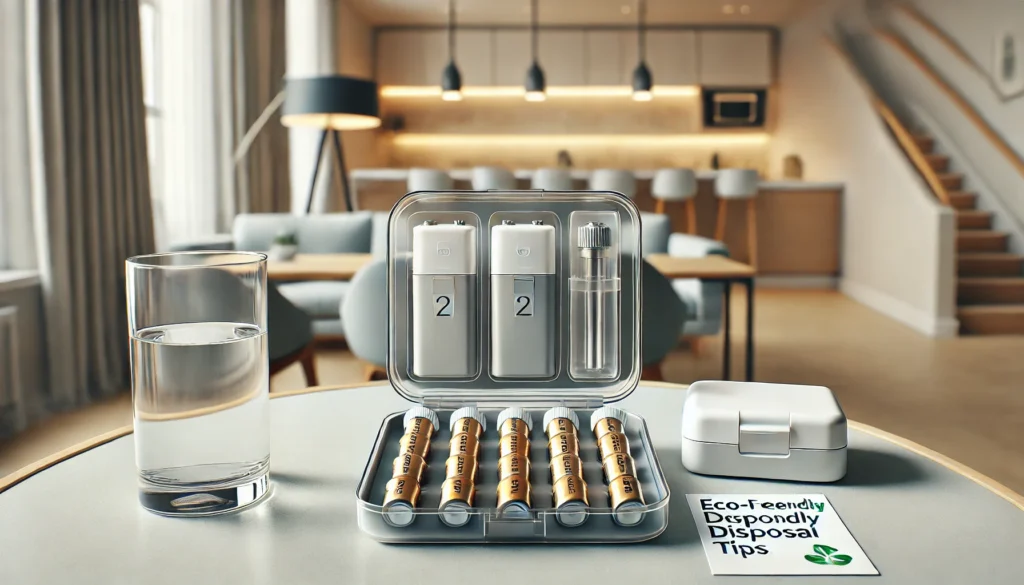Storing Hearing Aid Batteries
Hearing aid batteries are essential for maintaining the functionality of your hearing aids. Proper storage and handling of partially used batteries ensure longevity, consistent performance, and safety. This article provides 100% actionable insights and solutions to help you care for your batteries effectively.
Why Correct Battery Storage is Crucial
Improper storage of hearing aid batteries can result in:
- Battery Drain: Exposure to air activates zinc-air batteries, leading to unnecessary power loss.
- Corrosion: Moisture and humidity can damage the battery and hearing aid.
- Short Circuits: Contact with metallic objects can cause overheating or damage.
Understanding and avoiding these issues will ensure reliable operation of your hearing aids.
1. Best Practices for Storing Hearing Aid Batteries
Use Original Packaging or a Battery Case
- Store partially used batteries in their original packaging or a dedicated battery case.
- This prevents contact with dust, moisture, and other batteries, which can lead to short circuits.
Keep in a Cool, Dry Place
- Maintain batteries at room temperature (20–25°C).
- Avoid storing them in extreme temperatures:
- Heat: Speeds up chemical reactions, causing leaks.
- Cold: Causes condensation, leading to corrosion.
Avoid Mixing Old and New Batteries
- Mixing different batteries can cause uneven discharge or leakage.
- Dispose of old batteries promptly to prevent confusion.
Key Takeaway: Use a storage solution that isolates batteries from contaminants and maintains a stable environment.
2. Handling Partially Used Batteries
Activate Only When Ready
- Zinc-air batteries are activated when you peel off the protective tab. Once activated, they begin discharging.
- To maximize lifespan, only activate batteries when ready to use.
Turn Off Hearing Aids When Not in Use
- Always switch off your hearing aids when they are not in use to conserve battery power.
Inspect Batteries Regularly
- Check for visible damage, leaks, or corrosion. Replace damaged batteries immediately to protect your hearing aids.
3. Prolonging Battery Life
Store Batteries Correctly
- Keep unused batteries sealed until required.
- Use an airtight container with silica gel if you live in a humid climate.
Maintain Your Hearing Aids
- Clean hearing aids regularly to prevent wax and debris buildup, which can force batteries to work harder.
Follow Expiry Dates
- Batteries lose efficiency as they age. Use them before the expiration date for optimal performance.
4. Avoiding Common Mistakes
Don’t Refrigerate Batteries
- Contrary to popular belief, refrigeration is harmful to hearing aid batteries. Condensation can lead to rust and reduced performance.
Avoid Metal Contact
- Do not store batteries with coins, keys, or other metallic items. This can create a short circuit.
Don’t Leave Batteries in Hearing Aids During Inactivity
- If you’re not using your hearing aids for an extended period, remove the batteries to prevent leakage or corrosion.
5. Environmentally Responsible Disposal
Hearing aid batteries contain chemicals that can harm the environment if not disposed of properly. Follow these steps:
- Collect used batteries in a container to avoid accidental disposal.
- Drop them off at designated recycling centers or battery collection points.
- Follow your local guidelines for hazardous waste disposal.
Benefits: Responsible disposal reduces environmental impact and ensures compliance with waste management regulations.
6. Troubleshooting Battery Issues
Short Battery Life
- Cause: Humidity, prolonged activation, or poor storage.
- Solution: Store in a dry, cool place and activate only when needed.
Corrosion or Leakage
- Cause: Exposure to moisture or storing in extreme conditions.
- Solution: Use airtight storage and keep away from liquids.
Hearing Aids Powering Off Unexpectedly
- Cause: Weak or damaged batteries.
- Solution: Replace the battery and clean the hearing aid’s battery contacts.
FAQs About Hearing Aid Battery Storage
Q1: How long can partially used batteries be stored?
A: Partially used zinc-air batteries typically last 3–5 days after activation, depending on usage and storage conditions.
Q2: Can I reuse expired batteries?
A: It’s not recommended. Expired batteries may have reduced power or leak chemicals that damage your device.
Q3: Is a battery tester necessary?
A: Yes, a battery tester helps you check the remaining charge, ensuring reliable performance.
Conclusion
By following these best practices, you can maximize the life and performance of your hearing aid batteries while protecting your hearing device. Proper storage, timely handling, and responsible disposal will save you money, enhance the lifespan of your hearing aids, and contribute to a greener environment.
Take control of your hearing aid battery care today, and experience uninterrupted, high-quality hearing aid performance.

